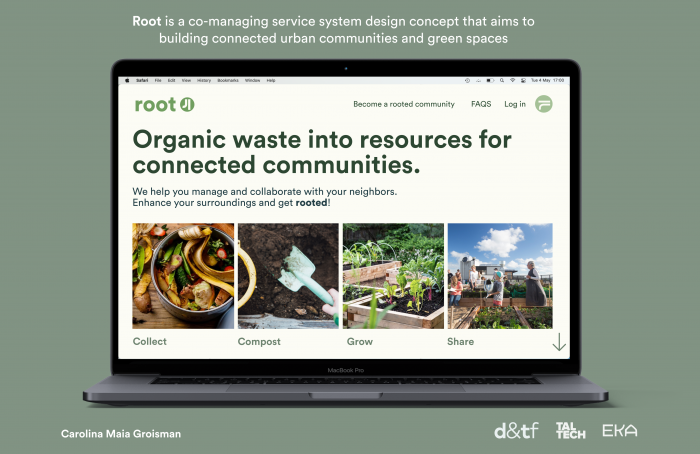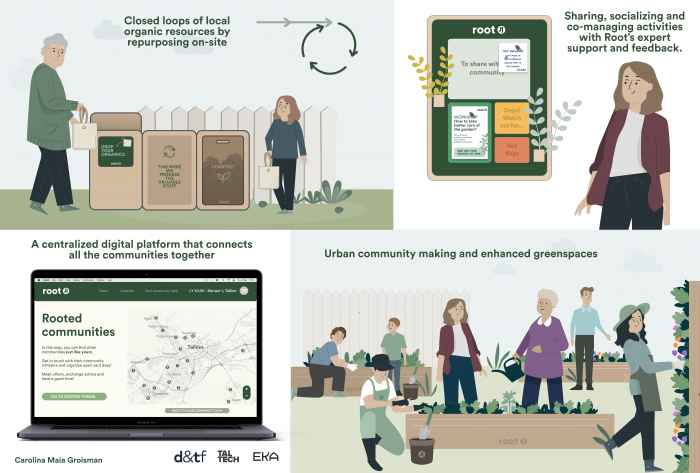I. SUMMARY INFORMATION
Project
267667
Status
Submitted
Award category
Reinvented places to meet and share
You want to submit
NEW EUROPEAN BAUHAUS RISING STARS : concepts or ideas submitted by young talents (aged 30 or less)
Project title
Root, a service system design concept
Full concept/idea title
Building connected urban communities and green spaces: a distributed service system design
Description
Root is a co-managing service system for urban communities that aims to transform biowaste into local resources for shared gardening, providing city dwellers with purpose, control and support to take collective action. As a result, local and more transparent resource loops are created in an inclusive and sustainable way, generating more purposeful, aware, connected and social communities and richer, more meaningful urban landscapes. It is about designing for change.
Where is your concept/idea being developed or intended to be implemented in the EU?
Estonia
Harjumaa
Kärneri 1
Tallinn
13522
II. DESCRIPTION OF THE PROJECT
Please provide a summary of your concept/ idea
Root is a supportive service system for urban apartment building dwellers that aims to transform organic waste into local resources for community gardening. With distribution and decentralisation at its core, the service proposes an alternative to traditional centralised waste management systems which gives community members a purpose, awareness, control and also supports their collective ways of living, by helping them create stronger bonds with their neighbors.
The service promotes the separate collection of bio waste and takes care of its local management and composting. A closed loop is created by giving these materials a local purpose, linked to urban gardening, which has great social and environmental benefits, promoting positive connections between people and between people and the environment. Gardening on top of soil fertilized with their own bio waste allows communities to grow fresh food and other plants right next to their homes, which not only enhances their surroundings and the environment but also the social relations amongst neighbors. In this way, organic materials become community resources, not waste.
The main functionalities enabled by the service are:
the collection of the community’s organic materials and the local management and processing into valuable collective resources;
the creation of urban gardens, which engages community members into collectively planning and co-managing their greenspaces with the expert support needed for during the different stages;
the social education of younger generations of the cultural norms of shared spaces and activities but also about the natural cycles and systems behind the food that reaches our tables in urban environments;
the making of urban communities, fostered by participation in shared gardening activities and other social gatherings amongst community members.
Please give information about the key objectives of your concept/idea in terms of sustainability and how these would be met
I delved into the problematique built around the urban waste landscape, with a focus on the biodegradable stream, analysing this systemic ‘wicked’ problem from different angles, individual and collective practices, management, business, political legislations and strategies (local and regional), environmental impacts, trends and opportunities.
The role of waste in the sustainable development of our living spaces, especially in urban areas, is being highly discussed and addressed around the world, the EU, Estonia, Tallinn but also luckily my hometown Buenos Aires, in Argentina.
separating the bio waste with a purpose, creates awareness amongst city dwellers towards other types of waste;
decentralised and localised management of bio waste, city dwellers own bio waste circles right next to them in their surroundings;
taking part of collective action towards mitigating the climate change.
diverting organic waste from incineration or landfill by increasing awareness and its separate collection;
reducing the emissions of greenhouse gases that result from the decomposition of organic waste in landfills;
reducing carbon footprint of municipal waste management by avoiding the transport of a specific waste stream;
new urban lifestyle by growing your own food and how it enables the access to locally sourced fresh produce;
Please give information about the key objectives of your concept/idea in terms of aesthetics and quality of experience beyond functionality and how these would be met
Root's main objective is offsetting from this out of sight, out of mind mindset and from those unused plain grass areas found in urban buildings, to create more purposeful communities, of people that are willing to get their hands dirty… in the process make better social connections and improve their surroundings, all by putting their bio waste to work for them.
The service system is based on a centralised digital platform that connects communities with the service and together with other communities, on a set of physical touchpoints, for collecting & composting bio waste and for gardening, but also for sharing information and on the support and management that helps set it all up, with service experts and the neighbours.
City dwellers get to contribute to enhancing their surroundings by changing significantly their common shared areas, which tend to be generally dull nowadays, providing them with social and environmental meaning and also with more beautiful, biodiverse, greener and richer landscapes.
The experience for people it is all about BUILDING:
- building value out of waste, - building communities and greener, richer surroundings, - and building of purpose, led by taking collective action.
For the environment it is about the LANDSCAPE, with the benefits that gardening brings to the urban biodiversity but also reducing greenhouse gases by diverting organics out of landfills...
Please give information about the key objectives of your concept/idea in terms of inclusion and how these would be been met
This design concept was developed with the framework of human centred design. During the field research, I conducted interviews with city dwellers, to create empathy and understand their needs, motivations and their waste practices. I concluded that the current system places the responsibility of recycling on people, relying on their diligence and decisions, but without providing no value and no meaning for it.
I have also referred to the Capability Approach to think about how people participate today and how they could participate with the introduction of new solutions in the future. Thinking in terms of CAPABILITIES (as proposed by Manzini in his work on social innovation) rather than people's problems, led to develop different types of personas.
The case study was people living in urban apartment buildings, where they act mostly individually, despite living and sharing spaces with others. I found as a general rule, there are people who care, are informed and aware, they put the effort to the separate collection, but get nothing in return, and overall don't know if their contribution makes any difference... On the other hand, there are still others who don't know, don't care or just don't have the time... so How to engage these people into being involved as well?
In any urban community, we can find all sorts of people:families with kids, seniors, young people but also, these people who are more aware of these issues and the ones who are not.This concept puts them all together and takes them all into account…
When it comes to giving responsibility to people, it should work for them, to fit their needs, their lifestyles, make sense for them, giving them meaning... And this is where community comes to play.
Urban communities are provided with support and tools for collective decision making and co-management of resources and gardening activities. And it is done thanks to all community members, the initiators, the active on
Please explain the innovative character of your concept/ idea
The values that the service as a business concept promotes are the idea of being part of a movement of urban change makers, who care for the future and are willing to raise awareness by acting in different ways, making those needed changes to the complex urban systems. It is all about making a positive impact and the creation of new types of urban lifestyles that results in the making and creation of closer and more social communities in shared living environments.
As more and more communities join the service to locally manage their organic resources and use them to collaborate in their shared gardens, the number of people engaged in the movement will increase as well. As a result of this bottom- up approach, of communities that are ‘rooting’ for new collaborative and more sustainable ways of doing things and managing resources, their local identities strengthen enough to become a bigger social pressure for their municipal and national governments. As a result, new regulations and legislations are expected to appear and be rolled out affecting all the stakeholders that take part in the system.
When it comes to the innovative character of the concept, the main goal was to address the co-management of the resources through a home-based service system. There are clear opportunities for repurposing bio waste by looking at the rising trend of urban composting, in different scales. Multiple projects around the world are testing alternative decentralised systems, where people are engaged into locally managing their own resources. As its known, fertiliser that results from composting is used to enrich soils, which led to research and include community gardening in the concept.Many existing solutions address these activities… but they do it separately. Linking them together could create a local resource loop for bio waste and Root helps communities manage those activities together.
Please detail the plans you have for the further development, promotion and/or implementation of your concept/idea, with a particular attention to the initiatives to be taken before May 2022
For June 2021: Set a social media account to share information about the project and recruit Community Initiators who would be interested in taking part of the service initial testing stages.
For July 2021: Develop the digital platform prototype
For August 2021: Set the physical touchpoints in at least 5 different communities across Tallinn.
During this initial period, communities will be able to try out the ideas and support offered by Root to improve their greenspaces and engage with their neighbors in social activities.
For October 2021: Testing rounds and conduct interviews with community members to gather feedback about the service.
III. UPLOAD PICTURES
IV. VALIDATION
By ticking this box, you declare that all the information provided in this form is factually correct, that the proposed concept/idea has not been proposed for the New European Bauhaus Rising Stars Awards more than once in the same category.
Yes

